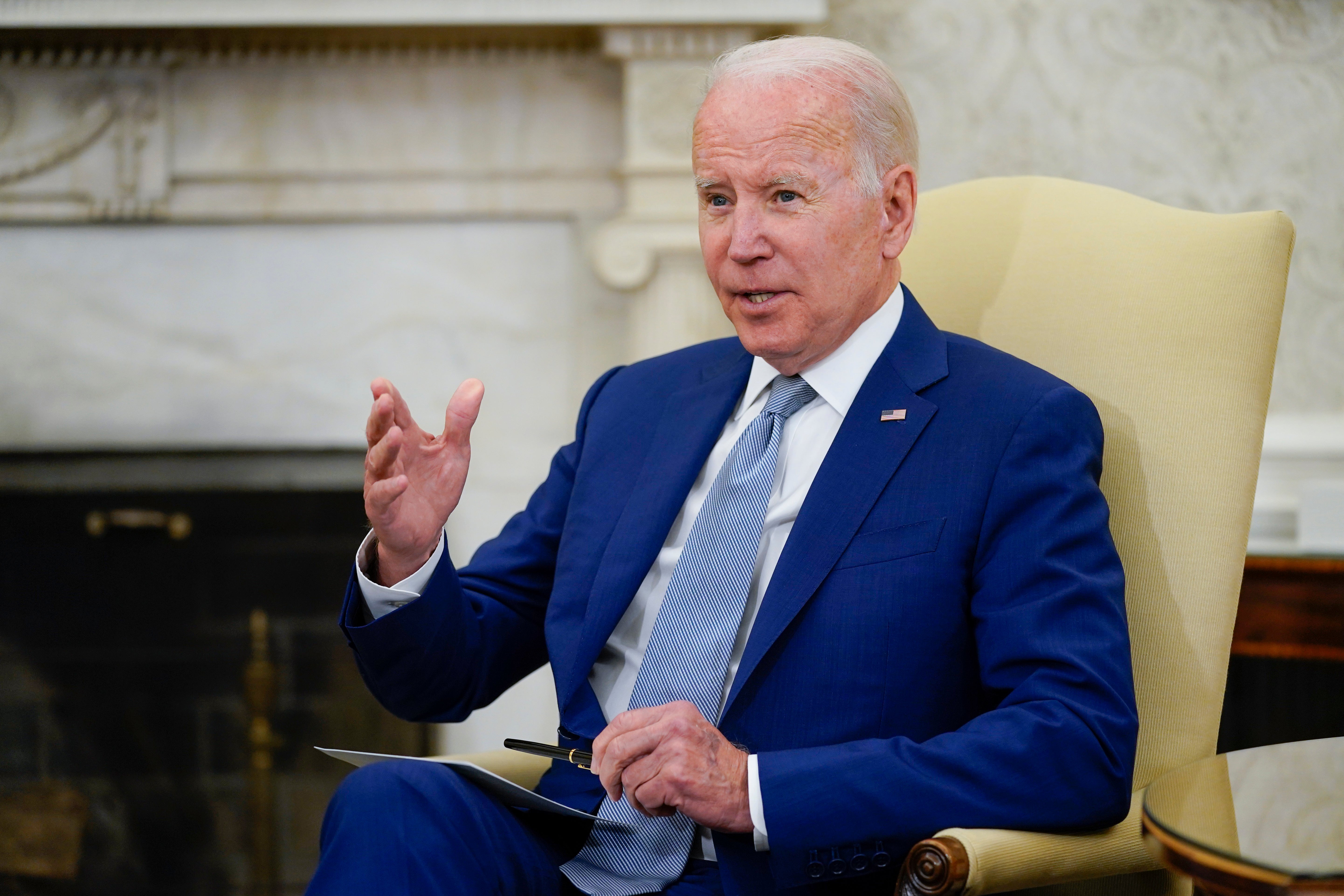Can Joe Biden deflate America — and will god-emperor Manchin let him?
Biden is trying to prove to everyone that he cares enough about inflation. Meanwhile, Democrats are cautiously optimistic about changing Manchin’s mind


Your support helps us to tell the story
From reproductive rights to climate change to Big Tech, The Independent is on the ground when the story is developing. Whether it's investigating the financials of Elon Musk's pro-Trump PAC or producing our latest documentary, 'The A Word', which shines a light on the American women fighting for reproductive rights, we know how important it is to parse out the facts from the messaging.
At such a critical moment in US history, we need reporters on the ground. Your donation allows us to keep sending journalists to speak to both sides of the story.
The Independent is trusted by Americans across the entire political spectrum. And unlike many other quality news outlets, we choose not to lock Americans out of our reporting and analysis with paywalls. We believe quality journalism should be available to everyone, paid for by those who can afford it.
Your support makes all the difference.For all that combating gun violence has dominated the agenda this week, the Biden administration is trying to assure the American public that the president takes inflation seriously.
On Monday, Joe Biden published an op-ed in The Wall Street Journal – whose opinion section is far from a liberal rag – wherein he laid out his plans to fight inflation. On Tuesday, he met with Federal Reserve Chairman Jerome Powell, whom the Senate just reconfirmed thanks to Biden nominating him for another term. The fact the president placed his essay in the Journal and the fact he renominated Powell – a Republican who worked in investment banking before joining the Fed in 2012 – are intended to be signs to markets and investors that Biden takes the markets’ concerns seriously.
There’s a reason why Biden needs to make that obvious. Last year, his chief of staff, Ron Klain, praised liberal economist (and occasional Biden administration critic) Jason Furman for a tweet remarking that inflation and supply chain problems were “high class problems” and that the Federal Reserve had considered inflation “transitory” until it shifted its rhetoric in December. This sort of talk makes people think that the White House doesn’t care about their plight. A CNN poll from earlier this month showed eight in 10 Americans think the government isn’t doing enough to combat inflation, and 55 per cent said Biden’s policies have made the economy worse. A poll from the beginning of this year showed many Americans didn’t think Biden was sufficiently focused on inflation.
Biden said in his essay that he would not interfere with the Federal Reserve’s proceedings, putting him in line with those who consider the central bank’s independence sacrosanct. At the same time, the president defended his economic stimulus policies – which many conservatives and even some Democratic economists blame for driving up prices – saying that his moves have prevented the bottom from falling out of the American economy.
For many people, that will ring hollow. While it is true that unemployment has dropped, and indeed that economic stimulus from both the Fed and the administration likely prevented the worst from happening, Americans now feel the pinch of inflation every time they open their wallets. As former Federal Reserve Chairman Ben Bernanke (who led the economy through the 2008 financial crisis) toldThe New York Times this month, “The difference between inflation and unemployment is that inflation affects just everybody.” That’s because “unemployment affects some people a lot, but most people don’t respond too much to unemployment because they’re not personally unemployed. Inflation has a social-wide kind of impact.”
Of course, there’s a case to be made that Americans’ concerns about rising prices and their desire to blame Uncle Joe are themselves inflated. As friend of the newsletter Arthur Delaney at HuffPost wrote in February, voters said they were worried about inflation back in 2013 – when inflation was nil and unemployment stubbornly high. The latent fear that any kind of government stimulus will turn Zanesville, Ohio into Zimbabwe or Waukegan, Illinois into the Weimar Republic means that when inflation actually hits, people’s angst is only compounded.
But of all the opinions Americans share, there is one voter in particular whose opinion matters more than anyone else’s: Senator Joe Manchin – who last year used the same Wall Street Journal op-ed pages to lay down why he opposed the $3.5 trillion Build Back Better package.
The news section of the paper has now reported that Democrats are cautiously optimistic about new talks between Manchin, who has become the on-off god-emperor of Washington, and Senate Majority Leader Chuck Schumer, who is trying to get some version of Biden’s economic agenda through the upper chamber before the midterms. The proposed agreement could raise $1 trillion in tax revenue and $500 billion in the next decade.
On Tuesday, Manchin tweeted that he wanted to cap the price of insulin, allow Medicare to negotiate drug prices and allow for the importation of drugs from Canada. All of these have been priorities for progressive and mainstream Democrats for some time. It’s not exactly a Vatican-style plume of white smoke, but it’s at least a puff. Maybe some moonshine is brewing on Manchin’s houseboat, Almost Heaven – and perhaps Democrats could be able to toast with it sometime soon.
Join our commenting forum
Join thought-provoking conversations, follow other Independent readers and see their replies
Comments